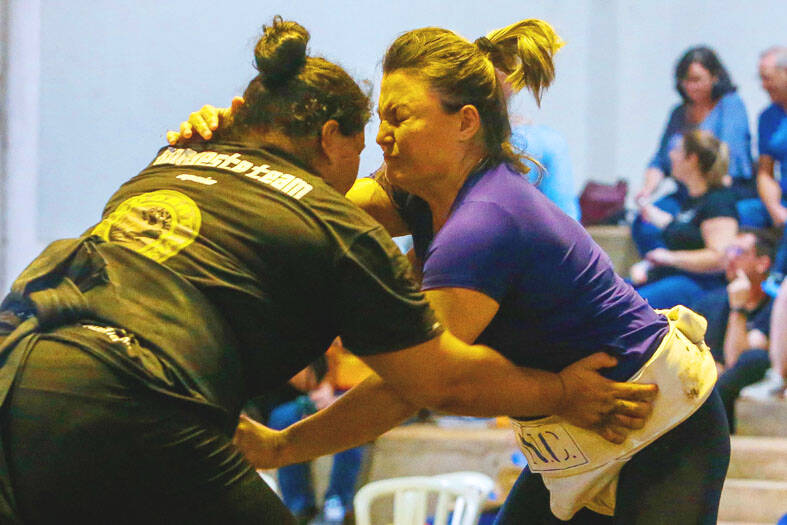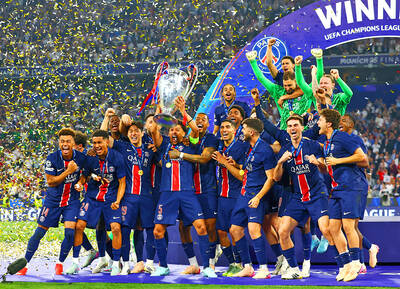If the phrase “sumo wrestler” calls to mind a hefty Asian man in a loincloth, Valeria and Diana Dall’Olio, a mother-daughter sumo wrestling team from Brazil, have a message: Think again.
The Dall’Olios are used to people saying they are too small, too fragile or “too female” to practice a sport typically associated with hulking Japanese men, but they say that is just fuel for their fighting spirit when they get in the dojo.
“There’s a lot of prejudice. When you say you practice sumo, some people think you have to be fat,” Valeria Dall’Olio, 39, told reporters as she prepared for a competition at a public gym in Sao Paulo. “Women are always under a microscope in the martial arts, because they’re sports that have generally been restricted to male fighters.”

Photo: AFP
She got into martial arts as a girl, studying judo and jiujitsu.
In 2016, she fell in love with sumo, which was brought to Brazil by Japanese immigrants in the early 20th century.
Soon she was winning bouts — all the way up to the Brazilian national title, which she won three times (2018, 2019 and 2021) in the middleweight category (65kg to 73kg).
She added the South American championship to her trophy case in 2021.
“I try to balance my different lives: homemaker, mother of two. I don’t have much free time,” Valeria Dall’Olio said.
Women are banned from professional sumo in Japan.
In its birthplace, the highly ritualized sport has been linked for more than 1,500 years to the Shinto religion, whose believers have traditionally seen women as impure or bad luck for sumo.
In the past, women were banned from attending bouts or even touching sumo wrestlers.
However, an international amateur women’s sumo championship has been held since 2001. Organizers hope to one day turn it into an Olympic sport.
Being allowed to compete “is a real victory for us,” Valeria Dall’Olio said. “We’ve got more fighting spirit than men, who usually aren’t used to battling on as many fronts as we are.”
Diana Dall’Olio, 18, said that she never had much interest in wrestling until she was attracted to sumo by its speed.
The bouts, in which wrestlers compete to fell or push one another from a circular, dirt-floor ring, rarely last more than 30 seconds.
Strength, strategy and technique are everything.
Diana Dall’Olio put on a mawashi, or sumo loincloth, for the first time in 2019.
She now competes as a lightweight (under 65kg).
“You can feel the prejudice,” she said of people’s reactions to her choice of sport. “A lot of people say: ‘Women are fragile, they get injured and quit.’”
“That’s one of the things we’re learning to fight against,” she said.

The Greek basketball league finals between Panathinaikos and Olympiakos were suspended by the government on Monday following on-court scuffles involving rival security teams. The best-of-five series is at 1-1. The third game, scheduled for today, has been postponed. The owners of both clubs were summoned to meet with the country’s sports minister. They “will be asked to provide explicit guarantees that this situation will be brought to an end. If not, this year’s championship will be definitively canceled,” government spokesman Pavlos Marinakis said. “There can be no tolerance for such pathological phenomena of violence and delinquency.” In online posts, the owners of Panathinaikos and

‘DREAM’: The 5-0 victory was PSG’s first Champions League title, and the biggest final win by any team in the 70-year history of the top-flight European competition Paris Saint-Germain won the Champions League for the first time as Luis Enrique’s brilliant young side outclassed Inter on Saturday in the most one-sided final ever with teenager Desire Doue scoring twice in an astonishing 5-0 victory. Doue supplied the pass for Achraf Hakimi to give PSG an early lead and the 19-year-old went from provider to finisher as his deflected shot doubled the advantage in the 20th minute. Doue scored again just after the hour mark, ending any doubt about the outcome before Khvicha Kvaratskhelia ran away to get the fourth and substitute Senny Mayulu, another teenager, made it five. Inter were

Ryan Yarbrough picked up a dazzling World Series ring from his time with the Los Angeles Dodgers last season. Then he went out and beat them. The New York Yankees starter on Sunday pitched one-run ball over six innings, struck out a season-high five and blanked the Dodgers’ top four hitters in a 7-3 win. “I feel like I’m in a really good place right now and really trying to continue that,” Yarbrough said. “I’m having a lot of fun.” The 33-year-old left-hander made 44 relief appearances between the Dodgers and Blue Jays last season. The Dodgers designated him for assignment on July

The Crusaders yesterday produced a clinical performance in difficult conditions to beat the Queensland Reds 32-12 and claim home advantage in next week’s Super Rugby semi-finals. Lock Scott Barrett and prop Tamaiti Williams scored first-half tries to reward an outstanding performance from the Crusaders’ forwards in wet, slippery conditions and bitterly cold temperatures. Scrumhalf Noah Hotham defied the conditions in the second half to score a superb solo try and, after kicking a conversion and penalty to make the score 22-0 at the hour mark, flyhalf Rivez Reihana scored a try which took the game beyond the Reds. “Typical Christchurch weather, cold, wet